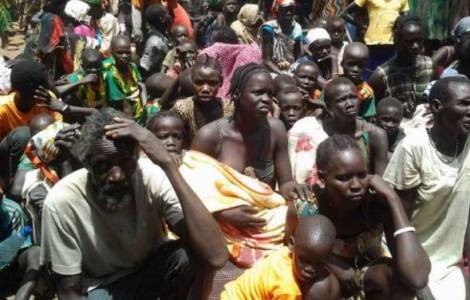By Deng Ghai Deng
Greater Pibor Administrative Area has been gripped by a devastating hunger crisis, with over 40 reported deaths due to starvation.
The dire situation has captured the attention of national and international bodies as the local government and humanitarian agencies scramble to address the escalating emergency.
Oleyo Akuer, the information minister for the Greater Pibor Administrative Area, confirmed that 43 people have died from hunger-related causes since June.
The most recent deaths involved three elderly women who perished last week, adding to the already staggering toll.
Akuer detailed the grim statistics, stating that in June alone, the areas of Pochalla, Likwangole, Jebal Buma, Marwo, and Loprap experienced a significant loss of lives due to severe food shortages.
“The starvation in the side of Likwangule there are about 12 who died, in Pochalla there 3 elderly women who died of hunger. In Pochalla, they told us that people who died out of hunger are 15,” Oleyo said.
“On cases from Jebel Buma, we were told there were 6 people who died because of hunger and the same number in Marwo while in Loprap we were told the hunger was so severe and the number of those who died were 7.”
Akuer described the situation as “alarming,” highlighting the severe impact of food scarcity across the administrative territory.
The crisis has prompted many residents to flee to neighbouring Ethiopia in search of food and safety, while those remaining in the area face worsening conditions.
The hunger crisis has been exacerbated by restricted supply routes. The main avenues for food aid and relief supplies from Juba, Eastern Equatoria, and neighbouring Ethiopia have been severely impacted, complicating efforts to deliver essential assistance to the affected regions.
In response to the crisis, a national government delegation, accompanied by representatives from the United Nations Mission in South Sudan (UNMISS), conducted a one-day flood assessment in the area on Monday.
This visit underscores the urgency of the situation and the need for immediate intervention to mitigate further loss of life and suffering.
The delegation’s assessment aims to address both the immediate needs of those affected and the underlying issues contributing to the food crisis.
The team is expected to provide recommendations and coordinate with international aid organizations to ensure that relief efforts are effective and reach those in greatest need.
The international community, along with humanitarian organizations, faces the critical challenge of mobilizing resources and support to alleviate the suffering in the Greater Pibor Administrative Area.
The situation calls for a concerted effort to address both the immediate humanitarian needs and the longer-term issues contributing to the region’s vulnerability to such crises.
As the world watches and responds to this unfolding tragedy, the people of South Sudan’s Greater Pibor Administrative Area continue to endure unimaginable hardship.
The coming days and weeks will be crucial in determining the effectiveness of the relief efforts and the potential for mitigating further loss and suffering.


